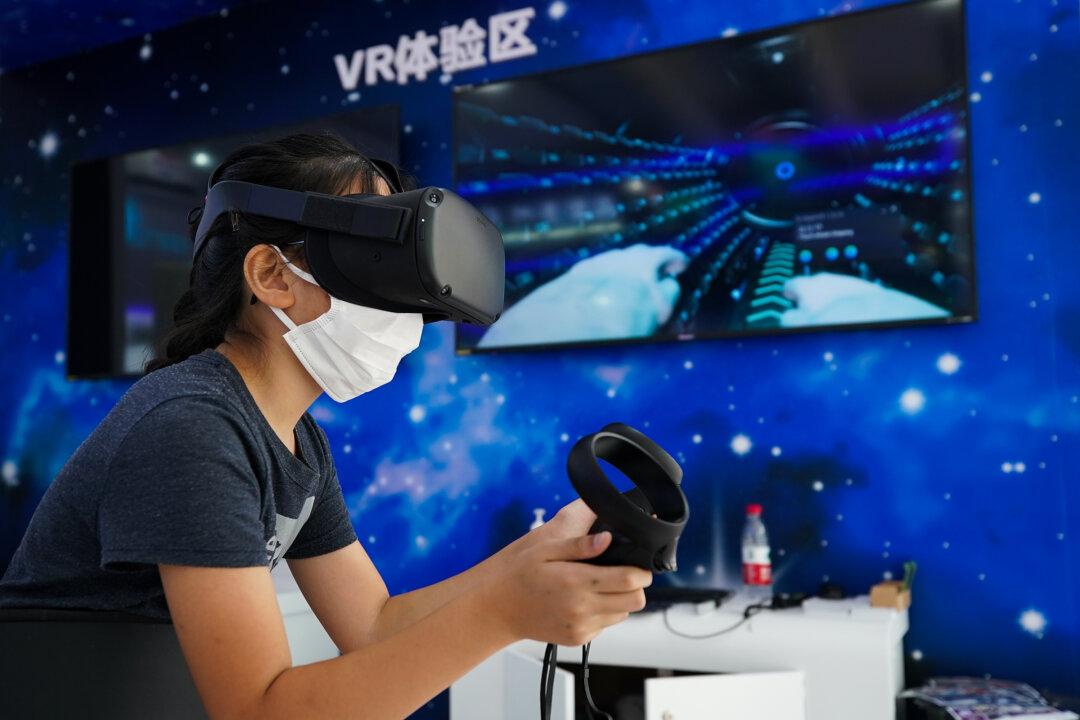Commentary
China’s technology giants are beginning to invest in the metaverse, and Beijing is readying its state-controlled censorship and regulatory gatekeepers.
There’s no definitive description of the metaverse (sometimes referred to as Web3), but it’s a term loosely used to describe computer-generated virtual worlds where people can live, play, and interact with others. A more interactive, 3-D version of the internet.
Software giants such as Facebook parent Meta Platforms and Microsoft as well as hardware developers such as Nvidia have been investing in the sector believing the metaverse as the next frontier in internet and gaming.
In China, the arms race is just beginning. Morgan Stanley analysts believe the Chinese metaverse total addressable market to be $8 trillion, in a Feb. note to clients. That’s roughly the size of the same market in the United States.
Mobile game maker NetEase, social app maker ByteDance, and social-media and payments conglomerate Tencent are some of the early leaders in Chinese metaverse development. Internet giant Baidu has also been developing its own metaverse virtual platform.
But the Chinese Communist Party (CCP)’s tight-fisted grip over media, free speech, and politics is unlikely to loosen in the virtual world. And this makes China’s metaverse a bit of a different animal. “After the regulatory reset in 2021, the government’s increasing focus on minors’ addiction, personal information protection, data security, openness of ecosystem, and so on suggests higher regulatory hurdles in China,” Morgan Stanley analysts say.
Last year, the CCP formed the so-called Metaverse Industry Committee chaired by state-owned telecom giant China Mobile, to establish rules and regulations for the nascent sector. There are various other committees and working groups at the national and provincial levels. Some Chinese cities including the Southern technology hub of Shenzhen have even included elements of the metaverse in city planning and development.
The CCP’s enthusiasm for the metaverse shouldn’t be confused as state support of this technology. The metaverse’s association with the gaming and cryptocurrency sector—two areas that Beijing has recently cracked down—means it’s a ripe area for the CCP to get involved in early and dictate what is and isn’t allowed within the virtual worlds.
In many ways, those technology firms currently investing in the metaverse have already been neutered.
During the last several months, various rules and regulations were introduced to curtail and control China’s technology giants. Those include anti-monopoly rules for internet platforms, a comprehensive personal data protection law, and in January new regulations governing the development of artificial intelligence (AI) and technology “algorithms” were enacted.
The last piece of legislation governing algorithms will tie into the CCP’s intention to censor content and speech on its metaverse platforms. The diversity and scale of the metaverse could make human monitoring of content impractical. Much of the content in the metaverse in the future could be generated and monitored by AI algorithms.
Another sensitive subject overlapping with the metaverse is cryptocurrencies. Many metaverse applications being developed outside of China plan to use forms of cryptocurrency tokens in transactions, serving as a form of virtual currency for exchange.
This is likely an issue for China as the CCP has practically banned usage, trading, and development of cryptocurrency tokens. Beijing has introduced its own digital currency, an electronic version of its yuan. Will the Party force metaverse builders to utilize the digital yuan as legal tender? It’s plausible.
Meanwhile, the CCP has already sounded the alarm on aspects of the metaverse. A Feb. 18 memo from the China Banking and Insurance Regulatory Commission—China’s top financial industry watchdog—warned participants of certain entities marketing scams masquerading as legitimate Metaverse investment projects. The CBIRC singled out two specific projects: Metaverse Investment Project and Metaverse Chain Tour.
There’s also a broader opportunity for the CCP to continue censorship, monitor, and control of its population through the metaverse. The metaverse, being enclosed systems, is easier to monitor using technology tools than the real world given China’s large swaths of land outside of cities where street cameras are sparse and cell receptions could be spotty.
And given the metaverse’s somewhat loose definition, the Party can entangle virtually any scientific or technology venture into the metaverse’s sphere of regulation.





